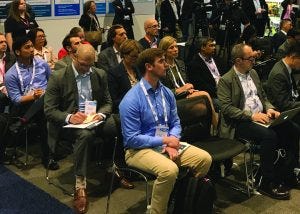- Sponsored Content
- Economics
It’s All About Speed: Getting to Early Development Clinical Trials QuicklyIt’s All About Speed: Getting to Early Development Clinical Trials Quickly
August 23, 2018
Sponsored by Thermo Fisher Scientific

The 2018 BPI Theater at BIO
David J. Kenyon, senior director of global scientific and technical affairs, Patheon (Thermo Fisher Scientific)
Kenyon has over 25 years of experience in the pharmaceutical/biotechnology and vaccine industries. He began his career with Johnson and Johnson, where he managed the production of the first monoclonal antibody (MAb) approved for human therapy. He joined Patheon in 2014. Kenyon received his PhD from the Rutgers School of Medicine and Dentistry of New Jersey.
Patheon is now part of Thermo Fisher Scientific. Thermo Fisher provides 400,000 customers worldwide with life sciences solutions, laboratory products, analytical instruments, and specialty diagnostics. Patheon is part of its pharma services group. The company provides process development services, clinical trial manufacturing, support, and logistics; and commercial manufacturing.
Data from the US Food and Drug Administration (FDA) show that the volume and approval pace of biologic therapies is accelerating. For instance, seven of 17 breakthrough therapies (41%) in 2017 were biologics. Although small molecules still account for 58% of the market, biologic therapies grew at 18% compared with a growth rate of 2% for small molecules over a two-year time period (2016–2018).
Client companies of all sizes are saying that they need to complete clinical trials quickly, they need complete datasets, they need sufficient drug product for all required testing, and they need to screen drug candidates fast. Small companies that are venture funded need to get their drugs into clinical trials as fast as possible. Large pharmaceutical companies that traditionally might have been able to do everything in-house now find themselves with multiple possible candidates and need outside help to screen all of them rapidly for further development.
Among critical topics to consider are the difference between investigation new drug (IND) filing and approval, the amount of stability data will be sufficient to suppose those, process development and the tradeoff between speed and process robustness, a company’s short and long-term objectives for each asset, and the quantity of material needed for all trials and studies.
Patheon is proud to offer its Quick to Clinic program for biologic drugs for first-in-human clinical trials. Patheon will provide what is necessary for “F3” – fast, flexible, and full – genes to produce IgG1 and IgG4 MAbs in 14 months or less and F3 clones in 12 months or less to begin first-in-human trials. It also will provide all the necessary data and testing to enable rapid IND submissions. For F3 genes, you bring your own genetic sequence, and Patheon will conduct your cell-line development. For the F3 clones, you already will have a cell-line developer and its accompanying media and feed. In both cases, you will end up with one kilogram of drug substance. In an additional two months, Patheon can fill your drug product up to 200-L scale. All the vial sizes have been prequalified, and your product can start immediately in the filling suite. Fisher Clinical services can assist you with preparation for clinical trials by providing primary and secondary labeling and packaging as well as specimen kits.
You May Also Like






